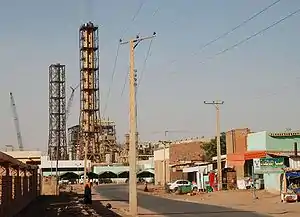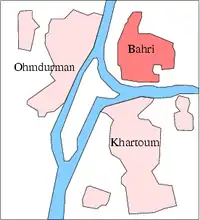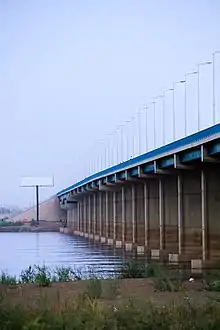Khartoum North
Khartoum North or Khartoum Bahri (Arabic: الخرطوم بحري, al-Kharṭūm Baḥrī) is a city in Khartoum State, lying to the north of Khartoum city, the capital of the Republic of Sudan. It is located on the north bank of the Blue Nile and the east bank of the River Nile, near the confluence of the Blue Nile with the White, and bridges connect it with both Khartoum to its south and Omdurman to its west.
Khartoum North
الخرطوم بحري | |
|---|---|
Neighborhood | |
 Industrial area of Khartoum North | |
| Nickname(s): Bahri | |
| Country | |
| Population | 1,012,211 |
It had a population of 1,012,211 at the last Sudanese census in 2008. It is part of a three-city agglomeration (with Khartoum proper and Omdurman) with a combined population of 4,272,728 in 2008.
Demographics

| Year | Population[1][2] |
|---|---|
| 1956 | 39,100 |
| 1973 | 150,989 |
| 1983 | 341,155 |
| 1993 | 700,887 |
| 2007 estimate | 1,725,570 |
History
The original settlement at Khartoum North, Halfaya, was long the largest settlement in the area of the Nile confluence before the Egyptians established Khartoum as their military garrison and administrative center in the 1820s.[3] It was thereafter eclipsed by the Egyptian Khartoum, its Mahdist replacement Omdurman, and the British refounding of Khartoum following their reconquest of the country in 1898. Khartoum North began to grow again, however, as the southern terminus of the Sudan Military Railroad, which was completed in 1899.[3] (The Blue Nile was bridged in 1910 and the line extended to Sennar, but Khartoum North continued to serve as the main railroad station and yard.)
On August 20, 1998 the Al-Shifa pharmaceutical factory was destroyed by a cruise missile because the United States accused the factory of making VX (nerve agent) for al-Qaeda.[4][5][6]
Economy and industry
The industrial centre of the region and the country, the neighborhood contains dockyards, marine and rail workshops, and sawmills. Khartoum North trades in cotton, grains, fruit, and livestock; industries include tanning, brewing, brickmaking, textile weaving, and food processing. Since the year 2000, chemical plants supplying household products to the rest of the country have been built in the neighborhood .
A wealthy suburb is growing towards the eastern part of the neighborhood, along the Blue Nile.
Neighbourhoods
Khartoum North has many neighborhoods, some of which are:
- Alamlaak
- Cooper
- Kafouri
- Bahri Industrial Area
- Al Haj Yousif
- Al Sababi
- Al Dnagla North
- Al Dnagla South
- Hilat Hamad
- Hilat Khojali
- Hilat Koko
- Alshabia North
- Alshabia South
- Almazad
- Almugtaribin
- Almerghania
- Alsafia
- Shambat
- Khoglab
- Alqadisia
- السامراب
- الدروشاب
- حطاب
- دردوق
- الحلفايه
- العزبه
- الكدرو
- ابو حليمه
- الجيلي
- نبته
- الفكي هاشم
Infrastructure

Bridges
The following bridges cross the Blue Nile and connect Khartoum North to Khartoum:
- Mac Nimir Bridge
- Blue Nile Road and Railway Bridge
- Cooper Bridge
- Al Mansheiya Bridge
- Shambat Bridge crosses the Nile and connects the neighborhood to Omdurman
Education
- University of Bahri

References
- Archived September 30, 2007, at the Wayback Machine
- Archived October 19, 2007, at the Wayback Machine
- "Chisholm, Hugh, ed. (1911). . Encyclopædia Britannica. 15 (11th ed.). Cambridge University Press. p. 773.
- Astill, James (October 2, 2001). "Strike one". The Guardian. London.
- "US Destruction of Al Shifa Factory 14th Anniversary". Sudanese embassy in Washington, DC. Archived from the original on 2013-01-17.
- Peterson, Scott. "Sudanese factory destroyed by US now a shrine". Christian Science Monitor.